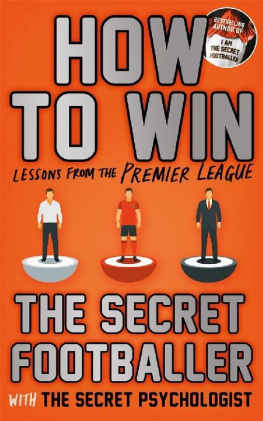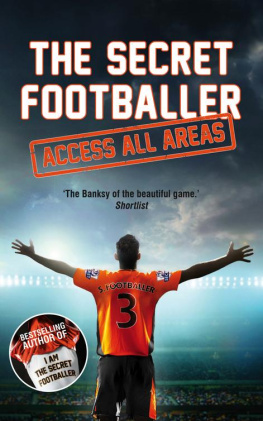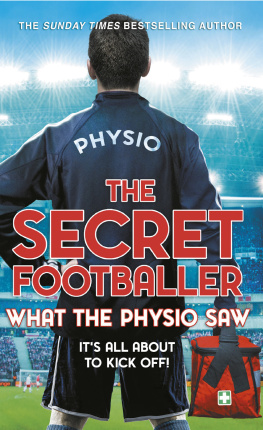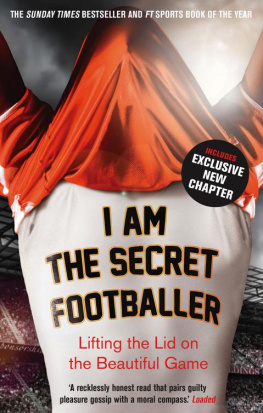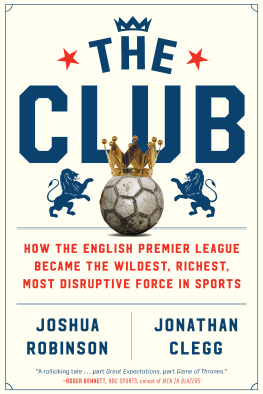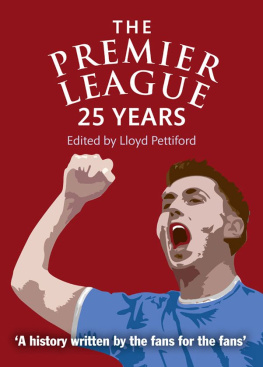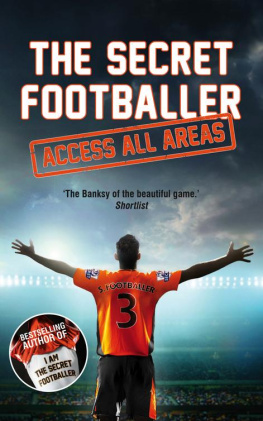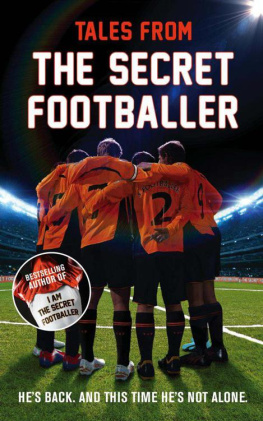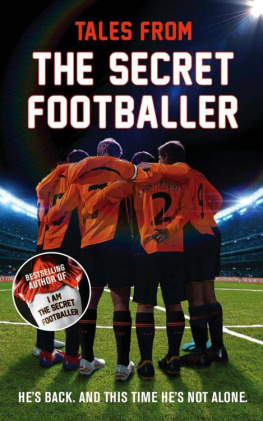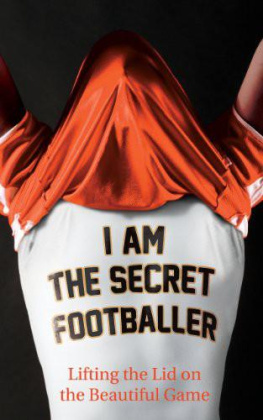The Secret Footballer - How to Win: Lessons from the Premier League
Here you can read online The Secret Footballer - How to Win: Lessons from the Premier League full text of the book (entire story) in english for free. Download pdf and epub, get meaning, cover and reviews about this ebook. year: 2017, publisher: Guardian Faber Publishing, genre: Detective and thriller. Description of the work, (preface) as well as reviews are available. Best literature library LitArk.com created for fans of good reading and offers a wide selection of genres:
Romance novel
Science fiction
Adventure
Detective
Science
History
Home and family
Prose
Art
Politics
Computer
Non-fiction
Religion
Business
Children
Humor
Choose a favorite category and find really read worthwhile books. Enjoy immersion in the world of imagination, feel the emotions of the characters or learn something new for yourself, make an fascinating discovery.
- Book:How to Win: Lessons from the Premier League
- Author:
- Publisher:Guardian Faber Publishing
- Genre:
- Year:2017
- Rating:5 / 5
- Favourites:Add to favourites
- Your mark:
- 100
- 1
- 2
- 3
- 4
- 5
How to Win: Lessons from the Premier League: summary, description and annotation
We offer to read an annotation, description, summary or preface (depends on what the author of the book "How to Win: Lessons from the Premier League" wrote himself). If you haven't found the necessary information about the book — write in the comments, we will try to find it.
How to Win: Lessons from the Premier League — read online for free the complete book (whole text) full work
Below is the text of the book, divided by pages. System saving the place of the last page read, allows you to conveniently read the book "How to Win: Lessons from the Premier League" online for free, without having to search again every time where you left off. Put a bookmark, and you can go to the page where you finished reading at any time.
Font size:
Interval:
Bookmark:


We are because we win. If we lose we no longer exist.
EDUARDO GALEANO , Soccer in Sun and Shadow
For Shakeel
A creative, a visionary and an inspiration
a powerhouse of positive thinking
19562015
1. ROOTS
Lessons learned early
2. PERFORM
Showmanship goes an awful long way in football
3. PRESSURE
Exceeding expectations, ignoring doubters and keeping your nerve
4. BEHIND THE SCENES
Why your manager threatened to stab you
5. THE TEAM
Working with them and for them
6. LEADERSHIP
The managers guide to mind control
7. FEAR
Risk and how to tackle it
8. PURPOSE
Finding it and holding on to it
9. THE SYSTEM
How to beat it and how to improve it
10. WHEN TIMES GET TOUGH
Transferred to the pit of despair
11. THE MINDS EYE
The art of visualisation
12. SOME HOME TRUTHS
What they dont teach you at St Georges
By Mrs TSF
When my husband announced that he was writing a book with a psychologist I assumed that the subject would be me. How have I coped? Do I use confirmation bias to justify a hasty selection in the mating department? To what extent do I use hindsight to minimise the effects of catastrophe? Is my general state of mind closer to acceptance than it is to anger?
My husband is a very complex man. But youve probably got that already.
I get to write the Foreword. God knows what comes after that.
He can be such a little boy at times, but then he displays a schizophrenic agility that lets him pivot 180 degrees and go toe-to-toe with anybody on any subject in any arena. Even if he knows nothing about it.
I knew him before he became a footballer. I knew him when he had nothing. He has always been the same. At his old place of work he taunted the bosses with his humour and they hated him for it. Personally, and this is hard for me to say, I know that he enjoys mentally messing with people who think that he is beneath them. Some people cant take it. They will cry like little babies. Others will run out of words and stick their fists up and fight. A few will run off and cry to somebody in authority.
My husbands weapon of choice is to mentally wear the person down to a tiny nub.
When my husband became a footballer there were inevitable fallings-out with people in positions of power. He always questions authority before he respects it. Most of the authority figures in football didnt have the right answers.
Once, he was told that he had to train with the youth team for the rest of the season after throwing a huff when hed been substituted in a big Premier League game. He reckoned he must have been the highest-paid youth-team player in history. For some people that thought would be enough. Money coming in. Who cares?
He embarked on revenge through psychological warfare, however. Every morning he walked out with the first team on to their training pitch and began warming up with them. The manager would send over one of his coaches to tell my husband that he had to go over and train with the youth team. Using a minion to do his dirty work. My husband never budged.
Tell him to come over here and tell me to train with the youth-team squad himself if thats what he wants.
The poor minion would run back and relay the message. The manager would trudge over in front of everybody to tell my husband what he had told him yesterday and the day before.
Go and train with the youth team.
And my husband would smile and turn away.
No problem.
He would jog off at a gentle pace towards the youth-team pitch, leaving behind a manager grinding his teeth and a first-team squad smiling to themselves. It was like Paul Newman tormenting the warden in Cool Hand Luke.
I know that the manager never really recovered. He did the small mans trick of trying to bully other people around the club to make himself feel tall. He wound up telling the team chef how to cook. One day he physically assaulted a player. The media got to hear about it. My husband can be very open about things when he feels like it. Shortly afterwards, the club announced that it had come to a mutually beneficial decision to terminate the managers contract.
Winning that war made my husband happy for a while but, generally, he is not a happy man. He is a calculating and decisive person and a lot of the time he is plain depressed. Like most footballers, he has an ego but he also has a huge fear of lots of the people around him. He hates talking to people because he thinks hes being recorded. He doesnt trust anybody and he is fiercely protective of himself.
As I say, he is a complex man.
Thats what makes him who he is. All the backdoors and nooks and crannies in his personality. He is always interesting to me. He never pandered to a crowd just hoping that more people might like him. His clubs, managers and the fans always had to take him on his own terms, even if that wasnt the most profitable way for him to operate. There were times when I wanted him just to be like everybody else. It would have been easier for him. Mostly, though, I loved the difference.
By the time he became a footballer, it was too late for football to realise that he wasnt the same as everybody else. He didnt go through an academy or a youth system in his teens. Hed lived in the real world. When football let him through the door it didnt know quite what it was getting.
He felt, and still feels, that all of the footballers who went before him simply didnt get it. He has told me often that in England the virtues that make a winning player are completely against the grain of what English people admire in their heroes. The British public dont outwardly support anything or anyone until winning is a foregone conclusion, and at that moment certain rough edges if thats what you want to call them are overlooked and forgiven. The person doing the winning needs to stay alert, though. The crowd can turn on them in a flash.
He always tells me that Lewis Hamilton is a winner but that he isnt liked by much of the British population because of his intense will to win and his selfishness in the way that he achieves success. His mentality is the same as Michael Schumachers was, but because Schumacher is foreign his attitude is acceptable.
He can reel them off: Stephen Hendry is another, a genius who wasnt loved by the British public despite dominating his sport, snooker. People preferred Jimmy White.
My husband reckons this country demands tragic characters who lose (but only by a narrow margin) and not relentless winners. Theres a hill at Wimbledon named after Tim Henman. Wasnt it Andy Murray who actually won the thing, though? Bit up himself, isnt he? Wouldnt hurt him to smile, would it? And whats with the mother? Sure, hes British when he wins Wimbledon, but should he lose the final of the Cincinnati Masters then hes definitely Scottish.
When my husband hit the big time, or the big time hit him (Ive never been sure which), he was a 23-year-old kid. And people suddenly decided that he was something of a hero. Fans of the club he was with were desperate for somebody to come along and change things, but they had been drip-fed a line of players who were incapable of pushing the club to the next level. Yes, they ran through walls and they tackled anything that moved. They were good old-fashioned British footballing stock and made the right noises, but never had the talent necessary to change anything.
Font size:
Interval:
Bookmark:
Similar books «How to Win: Lessons from the Premier League»
Look at similar books to How to Win: Lessons from the Premier League. We have selected literature similar in name and meaning in the hope of providing readers with more options to find new, interesting, not yet read works.
Discussion, reviews of the book How to Win: Lessons from the Premier League and just readers' own opinions. Leave your comments, write what you think about the work, its meaning or the main characters. Specify what exactly you liked and what you didn't like, and why you think so.

